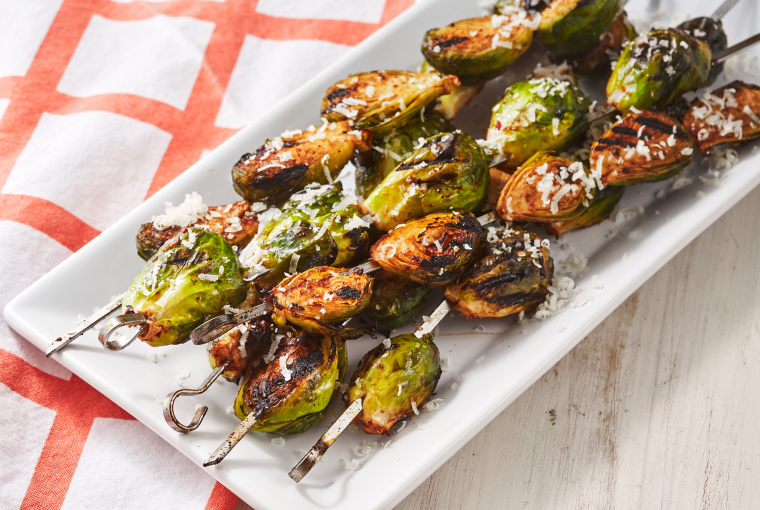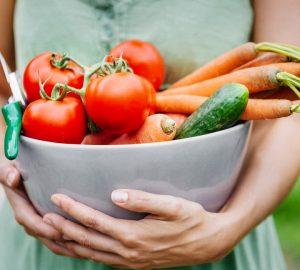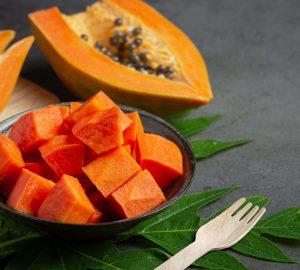What’s round, green, full of gut-healthy fiber…and in season right now? You guessed it. Brussel sprouts baby. The cruciferous vegetable is at its best in the fall and winter months, making it prime time to add to your cooking routine.
A short primer on their benefits: Brussel sprouts are an excellent source of both vitamins C and K, says Kelly Jones, RD, as well as a good source of other vitamins and minerals including folate and potassium. “Brussel sprouts also offer support to the balance of bacteria in the digestive tract, while providing a variety of phytochemicals such as sulforaphane, which is researched for its antioxidant properties,” she says.
But if you grew up in a household where boiling veggies is the norm, you might be wondering how to prepare Brussel sprouts for lunch and dinner in a way that doesn’t leech out all the flavor or nutrients. “Because vitamin C and folate can be lost when boiling, I do not recommend that method for cooking them or other vegetables,” Jones says.
Thankfully, there are several other easy ways to cook with Brussel sprouts that are healthy *and* delicious. Your work or at school lunch won’t know what hit them.
1. Halve and roast them
Roasting or air frying Brussel sprouts is Jones’s go-to preparation method. “After halving or quartering each sprout, just drizzle with some olive or avocado oil along with salt and pepper, and roast on a baking sheet at 400 degrees Fahrenheit for 30 or more minutes, until desired texture is reached,” she says. Be sure to stir the sprouts a few times while they’re in the oven to ensure they all cook evenly, she adds.
“You can also roast Brussel sprouts with potatoes and your favorite protein on a large sheet pan with whatever seasoning blend you have on hand,” Jones says. If you make a lunch salad with chicken, for example, you can roast the Brussel sprouts and chicken together ahead of time. (This combo, FYI, would be great with ancient grains, nuts, goat cheese, and diced squash.)
Once you have your roasted Brussel sprouts, you can use them in a variety of ways. You can add them as-is in your go-to salad recipe, or combine them with seasonal ingredients like cranberries, feta, and roasted squash to make more of a fall-forward dish.
Your roasted Brussel sprouts are good for any time of day, too. “You can also chop leftovers for use in omelets or frittatas,” Jones adds. “Pairing with caramelized or roasted onions in this application is delicious.”
2. Shave and eat raw
This option works for both lunchtime salads and cooked dinners. “You can eat Brussel sprouts raw, but they’ll taste better and be easier to chew and digest if you shave them down with a mandolin or grate them,” says Jones. (If you want to spend a bit more money, you can save time and buy them pre-shredded at many grocery stores.)
Then, just use the shredded leaves as you would any salad green—either as the base of your dish or as a side or topping. Shaved Brussel sprouts pair nicely with a maple mustard vinaigrette (one of Jones’s favorites) or any healthy dressing you like.
You can also use your shaved Brussel sprouts to make a homemade slaw. If you want to cut back on saturated fat, use an apple cider vinaigrette base or honey mustard instead of mayonnaise, says Jones.
You can also sauté shaved Brussel sprouts in a pan, Jones adds. That will keep them warm but still thin, so it could be a good option for a warmer salad.
3. Crisp up the leaves for veggie-forward “croutons”
If you are roasting or air frying the Brussel sprouts, you can get the leaves extra crispy and charred. Then you can simply take the Brussel sprouts leaves and make them veggie-centric croutons in your salad! They will be crispy and crunchy, but they’ll have more nutrition and tons of flavor. Talk about a win-win.




